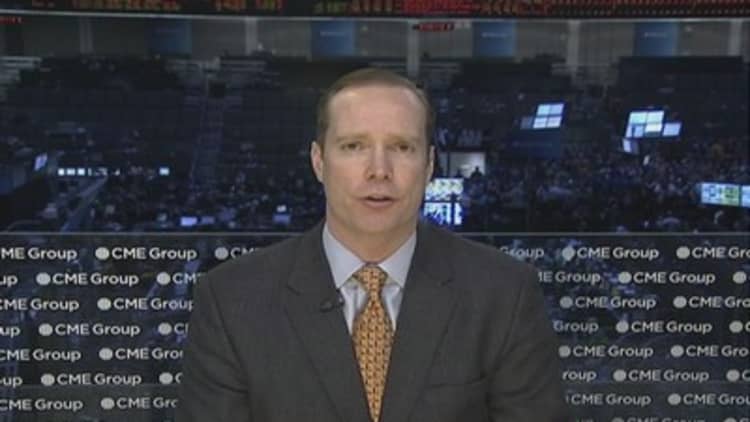
Coffee futures have risen some 20 cents per pound since early November—a 19 percent rise that nearly puts the commodity in technical bull market territory. But that doesn't mean the price of your morning latte is about to skyrocket.
First of all, November's $1.01 marked a seven-year low for coffee futures. Coffee has been under pressure due to high levels of production out of the world's largest coffee grower, Brazil. But supply is expected to be lower in 2014, particularly due to recent inclement weather.
December 2013 was "an extremely wet month" for many parts of Brazil, the NASA Earth Observatory reported. And rain can damage coffee plants, reducing output and consequently boosting price.
"We have seen quite a turbulent move to the upside, and that's because of some forecast changes," said futures trader Jeff Kilburg of KKM Financial.
"We saw forecaster Volcafe tone down their optimistic estimates. A lot of folks have been thinking about 60 million bags [of supply], but what we saw in December down in Brazil is a substantial amount of rain, potentially damaging the product. Therefore we are seeing the forecast drop down to 51 million bags, and that really put a sense of urgency into folks coming in and buying it."
At this point, short-term price action is expected to depend on expectations of 2014 supply. But the broader story behind the long decline in prices—which have dropped from $3 in mid-2011—is that producers are finally growing enough coffee to match demand.
"Demand for coffee has expanded dramatically for four or five years, and it's taken a while for global supply to catch up," explained Jonathan Feeney, food and beverage analyst at Janney Montgomery Scott. "Well, now it has."
Feeney pins the increase in demand on the growing middle classes in emerging markets as well as on consumption in the U.S. that continues to increase. But even as the price has plunged over the past three years, consumers have rarely seen lower prices.
(Read more: Starbucks makes its latte cheaper—and more mobile)
"Consumer prices have underpaced the drop, which is of course a boon to companies like J.M. Smucker that produce coffee," Feeney said.
Still, a lot goes into the price of a cup of coffee, or a bag of roasted coffee, besides the beans themselves. That's why coffee that trades on the futures market for $1.20 per pound is sold in Starbucks for $12 per pound, or by specialty coffee roasters like Blue Bottle for as much as $26 per pound.
"What you're paying for is the brand, the quality of the roasting and the selection of the beans," Feeney explained. "There's also a pretty healthy profit margin."
(Read more: Woman eats only Starbucks items for a year)
For those who drink more expensive coffee, the price fluctuations in the futures market are unlikely to have much impact at all.
"I do believe that the cost of specialty coffee, which we purchase, is only going to increase in the years to come," commented Rachel Haughey, the owner of espresso NEAT, an upscale coffee shop in Darien, Conn.
"NEAT operates in the top .01 percent of the coffee market, where commodity prices don't have much of an impact, because the quality differential is so significant," said Haughey, who previously worked as a commodities trader.
Across the retail side, another factor is hedging by roasters.
"The roasters have been hedged at even higher levels than we're at now," said Nick Becharas, president of Michigan-based roasting company Becharas Brothers Coffee. So though the price has risen recently, "I wouldn't anticipate any ramifications for the consumer at this point."
(Read more: Why this could be the year of the commodities comeback)
All in all, traders say coffee's upside move could now be constrained.
"Volatility will persist," predicted Kilburg, "but unless the early summer harvest falls well short of the expected surplus of 60 million bags, prices will have a hard time getting above $1.50."
—By CNBC's Alex Rosenberg. Follow him on Twitter: @CNBCAlex.



